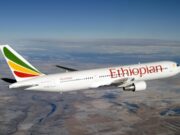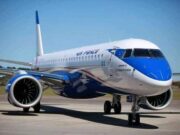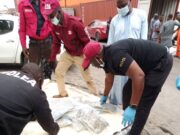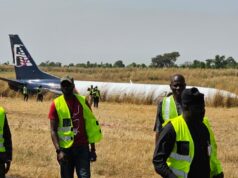The Accident Investigation Bureau has called on the Nigerian Civil Aviation Authority NCAA to carry out safety audit of Azman Air Ltd to ensure all the elements of safety management system are implemented accordingly.
The called is contained in the safety recommendations of the final accident investigation report into the serious incident involving a Boeing 737-500 at the Port Harcourt airport operated by AZMAN air on 3rd January, 2019.
At the release of the report Wednesday in Abuja, the AIB Commissioner, Mr. Akin Olateru said, the NCAA should immediately ensure Azman Air takes further necessary step to ensure that it reviews the training of the incident flight crew in order to be able to understand and recognise engine failure and malfunctions and its effect (s) at every phase of flight before they are allowed to resume flight duties.
“Azman Air Services Limited should ensure that all its flight crew possess the requisite qualification as contained in Azman Air Services Operations Manual Part A chapter 6 before they are assigned flight duties/responsibilities”.
“Azman Air Services Limited should develop strategies to implement its safety policy, including the propagation of safety culture in the organisation”.
The report attributed the causes of the Azman serious incident to the failure of number 4 and 5 bearings of engine number 2 leading to loss of power during approach.
Accroding to the Contributory factors, the AIB Commissioner said, “the failure to recognise the abnormal engine conditions (surge) during cruise phase and hence, not making appropriate decision. This might have been connected to the insufficient technical knowledge and loss of situational awareness”.
Other final reports released include the serious incident involving a Boeing 747-400 aircraft operated by Max Air Limited, which occurred at the Minna Airport, Nigeria on 7th September, 2019 was linked to excessive rudder and aileron inputs at short finals phase of the approach and the decision to continue the ILS approach runway 05 with erratic localizer signals.
While that of the Police Airwings serious incident was caused by uncoordinated flight as a result of inadequate Crew Resource Management (CRM) that led to the partial release of parking brake, which resulted in rejected take-off.
“Inability of the aircraft to get airborne after attaining the rotation speed (Vr) during take-off roll even with aft elevator pressure”.
“Non-adherence to Standard Operating Procedures (SOPs) as contained in the Cessna Citation 560 XLS+ Airplane Flight Manual”.
These reports Mr. Olateru are essential to the fulfilment of the Bureau’s mandate of investigating aircraft accidents and serious incident with the aim of enhancing safety, through safety recommendations issued, thereby assuring safe skies in Nigeria and Globally.
“We remain committed, through improving our processes, human capacity and equipment, to fulfil our mandate effectively, purposefully and professionally”.
He added, “These reports are essential to the fulfilment of the Bureau’s mandate of investigating aircraft accidents and serious incident with the aim of enhancing safety, through safety recommendations issued, thereby assuring safe skies in Nigeria and Globally “.
The AIB issued 20 safety recommendations into the three serious incidents for the relevant agencies to implement.
Max Air
Safety Recommendations
1.Federal Airports Authority of Nigeria (FAAN) should ensure that the Aerodrome Manuals including Safety Management System (SMS) manuals are updated and submitted to Nigerian Civil Aviation Authority (NCAA) for approval.
2.Federal Airports Authority of Nigeria (FAAN) should ensure that all airfield lightings are properly maintained and kept serviceable.
3.Federal Airports Authority of Nigeria (FAAN) should ensure that Aerodrome Emergency Plan (AEP) is operational and test run as required by the Nig.CARs 12.6.15.1.
4.Federal Airports Authority of Nigeria (FAAN) should ensure that Aerodrome Rescue and Fire Fighting Service (ARFFS) equipment are of the appropriate standard and minimum requirements for the category of aircraft expected to land at Minna airport.
5. Nigerian Airspace Management Agency (NAMA) should ensure that all navigational aids are maintained and calibrated in accordance with the standards prescribed in Nig. CARs 14.1.49.3.
6. Nigerian Civil Aviation Authority (NCAA) should ensure that all relevant programs and their attendant manuals for Minna airport are reviewed and subjected to the approval procedures.
7.Max Air Limited should ensure that its flight crew are encouraged to consider executing go-around procedure when not stabilized on final approach.
Nigerian Police Airwings
Safety Recommendations
1.Cessna Aircraft Company (Textron Aviation), USA should consider redesigning the parking brake system of Cessna Citation XLS+ to incorporate take-off protection, visual and aural warnings and also make the position visible to both occupants of the cockpit.
2.The Nigeria Police Airwing should develop Operations Manuals and Standard Operating Procedures in accordance with the provisions of sub-part 8.14 of the Nigeria Civil Aviation Regulations for guidance.
3.The Nigeria Police Airwing should ensure that flight crew adhere to all provisions of CRM during flight operations.
4.Nigeria Civil Aviation Authority should ensure that NPAW flight operations are carried out in accordance with relevant provisions of Nig. CARs 2015.
5.The Nigeria Civil Aviation Authority (Principal Maintenance Inspector (PMI)/Principal Operations Inspector (POI)) attached to Nigeria Police Airwing should intensify oversight function on Nigeria Police Airwing’s operations.
Azman Air
Safety Recommendations
1.Azman Air Services Limited should implement fully, the Flight Data Monitoring programme as stipulated in 2.2.5 of the Azman Air Safety Management System Manual, including holding regular FDM meetings, timely corrective actions on the anomalies identified in FDM reports, distribution to all concerned personnel for timely corrective actions, entering the anomalies into the safety risk management process
and presentation during the senior management review, if relevant.
2.Azman Air Services Limited should review relevant portions of its Operations Manual, including 5.1.3 of Azman Air Ltd Operations Manual Part A to specify the criteria for determining the experience level required for crew composition.
3.Azman Air Services Limited should ensure that all its flight crew possess the requisite qualification as contained in Azman Air Services Operations Manual Part A chapter 6 before they are assigned flight duties/responsibilities.
4.Azman Air Services Limited should develop strategies to implement its safety policy, including the propagation of safety culture in the organisation.
5.Azman Air should include the one/single engine out manoeuvre during approach in its simulator curriculum.
6.NigerianCivil Aviation Authority should carry out safety audit of Azman Air Ltd to ensure all the elements of safety management system are implemented accordingly.
7.Nigerian Civil Aviation Authority should review the Nigeria Civil Aviation Regulation (Nig. CARs) 2015 to meet the International Standards and Recommended Practices as contained in the Annexes to the Chicago Conventions, including 9.2.2.10 to incorporate the provisions that mandated an AOC holder that operates aircraft with a maximum certificated take-off mass of more than 27,000 kg to include a flight data monitoring programme as part of its safety management system.





























